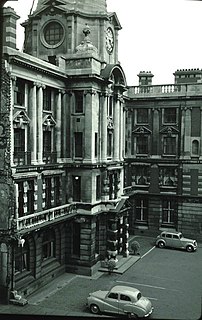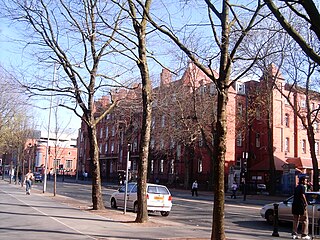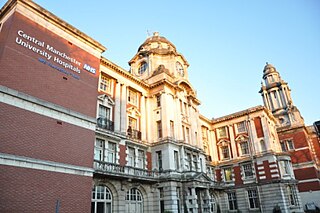
The Whittington Hospital is a district general and teaching hospital of UCL Medical School and Middlesex University School of Health and Social Sciences. Located in Upper Holloway, it is named after Sir Richard Whittington, an English merchant, and managed by The Whittington Hospital NHS Trust, operating as Whittington Health, an integrated care organisation providing hospital and community health services in the north London boroughs of Islington and Haringey.

Swinton is a town in Greater Manchester, England, southwest of the River Irwell, 3.4 miles (5.5 km) northwest of Salford and 4.2 miles (6.8 km) northwest of Manchester, adjoining the towns of Pendlebury and Clifton. In 2014, it had a population of 22,931.

Saint Mary's Hospital is a hospital in Manchester, England. It is part of Manchester University NHS Foundation Trust. Founded in 1790, St Mary's provides a range of inter-related services specifically for women and children.

Manchester Royal Infirmary is a hospital in Manchester, England, founded by Charles White in 1752. It is now part of Manchester University NHS Foundation Trust, sharing buildings and facilities with several other hospitals.
Salford Royal NHS Foundation Trust operates Salford Royal Hospital. It is one of the top performing trusts in the United Kingdom. The trust is currently under the leadership of chair Jim Potter and chief executive Raj Jain.

North Manchester General Hospital is a large NHS hospital located in Crumpsall in the north of the English city of Manchester. It is operated as part of the Pennine Acute Hospitals NHS Trust. There is an accident and emergency unit, together with a maternity unit, high dependency unit and a mental health wing.

Ancoats Hospital was the commonly used name for the large inner-city hospital, located in Ancoats, to the north of the city centre of Manchester, England. Its official name was Ancoats Hospital and Ardwick and Ancoats Dispensary from 1875, when it replaced the Ardwick and Ancoats Dispensary that had existed since 1828.

Withington Community Hospital is a hospital in south Manchester, England, managed by the Manchester University NHS Foundation Trust.

Stobhill Hospital is an Ambulatory Care and Diagnostic Hospital, located in Springburn in the north of Glasgow, Scotland. It serves the population of North Glasgow and part of East Dunbartonshire. It is managed by NHS Greater Glasgow and Clyde.

Manchester Royal Eye Hospital is an ophthalmic hospital in Manchester, England. It is managed by the Manchester University NHS Foundation Trust. It is located on the same site as the Manchester Royal Infirmary and St Mary's Hospital for Women and Children.

Little Hulton is an area within the City of Salford, Greater Manchester, England, 3.4 miles (5.5 km) south of Bolton, 7 miles (11.3 km) west-northwest of Salford, and 9 miles (14.5 km) west-northwest of Manchester. Little Hulton is bordered by Farnworth to the north and Walkden to the east.

The University Hospital of South Manchester NHS Foundation Trust is a defunct NHS Foundation Trust that previously operated Wythenshawe Hospital, a major acute teaching hospital in Wythenshawe, Manchester. Many of the services and facilities previously at Withington Hospital were transferred to Wythenshawe in 2004. It provided services for adults and children at Wythenshawe Hospital and Withington Community Hospital. It runs Buccleuch Lodge Intermediate Care Unit and the Dermot Murphy Centre in Withington, and the Specialised Ability Centre in Sharston.
The Bolton NHS Foundation Trust is based at the Royal Bolton Hospital in Farnworth, Greater Manchester, England. It provides NHS health care services for the people in the Metropolitan Borough of Bolton and surrounding areas. Prior to its acquisition of Foundation Trust status in October 2008, the trust was known as Bolton Hospitals NHS Trust. Bolton Hospitals integrated with some of the community services which were formerly part of Bolton Primary Care Trust in July 2011 to form Bolton NHS Foundation Trust.
10 Clinical Commissioning Groups (CCGs) - one for each of Greater Manchester's metropolitan boroughs - organise the delivery of NHS services within Greater Manchester. The chief executive of the corresponding local authorities are to take over the CCG accountable officer role on a phased dual basis, forming a “single commissioning function” integrated with local government.

The Queen Elizabeth University Hospital (QEUH) is a 1,677-bed acute hospital located in Shieldhall (Govan) in the south-west of Glasgow, Scotland, United Kingdom. The hospital is built on the site of the former Southern General Hospital and opened at the end of April 2015. The hospital comprises a newly built 1,109-bed adult hospital, a 256-bed children’s hospital and two major Emergency Departments, one for adults and one for children, in addition to buildings retained from the former hospital. There is also an Immediate Assessment Unit for local GPs and out-of-hours services, to send patients directly, without having to be processed through the Emergency Department.

Salford Royal Hospital, is a large university teaching hospital in Pendleton, Salford, England operated by Salford Royal NHS Foundation Trust. It is one of the top performing hospitals in the United Kingdom.



























